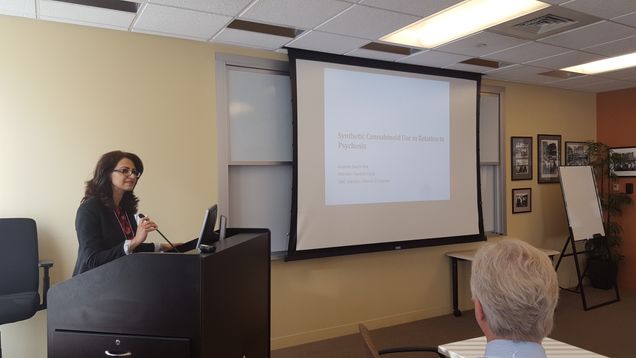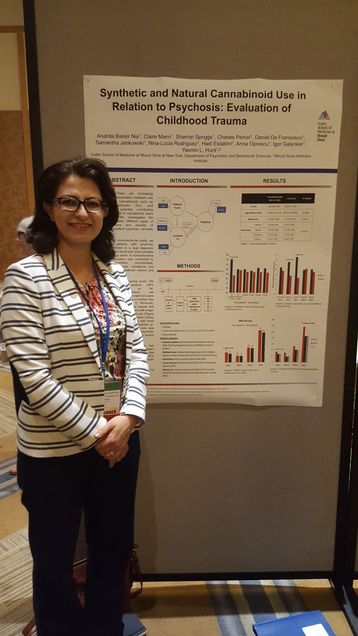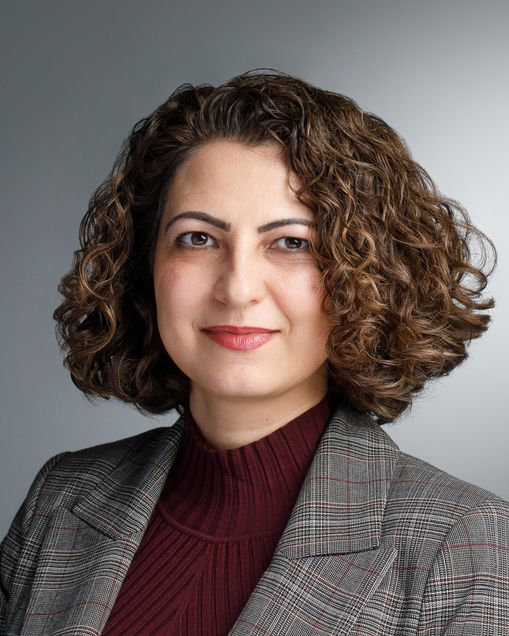RAMS Alumni Spotlight: Dr. Anahita Bassir Nia
For our August 2025 RAMS Alumni Spotlight, we interviewed Dr. Anahita Bassir Nia, MD from the 5th RAMS Cohort (2016-2018) about her background and work since completing the RAMS Program.
Anahita is an Addiction Psychiatrist and Assistant Professor of Psychiatry at Yale School of Medicine. She has focused her research on translational science to understand the neurobiology of stress-related psychiatric disorders such as substance use disorders and post-traumatic stress disorder (PTSD). The ultimate goal of her research is to identify novel biological targets in treating these disorders.
Read on to learn more about Anahita!
Tell us about your clinical and research background. What led you to study substance use?
By training, I’m a psychiatrist and an addiction psychiatrist. I completed my psychiatry residency and Addiction Psychiatry fellowship at Mount Sinai, New York, and then joined Yale as an Assistant Professor of Psychiatry in 2018.
I started getting more interested in addiction during my psychiatry residency at Mount Sinai. I was a 2nd year resident, and we had a dual diagnosis inpatient unit. Many of the patients had both SUD and some other primary psychiatric disorders. During that rotation for the first time, I realized how complicated SUDs are and how challenging it can be to treat them. I also realized that there is a high rate of SUDs in individuals with other psychiatric disorders. This continued during my third year of residency – I was at an outpatient clinic, where many of my patients had SUDs. This is something I observed for the rest of my residency. I found treatment for SUDs very complicated, and something that needs an approach from different perspectives. We had a multi-disciplinary team including psychologists, social workers, and pharmacists to address the challenges in SUD treatment. That’s where I started getting more interested in addiction, and then I completed my addiction psychiatry fellowship at Mount Sinai Addiction Psychiatry Fellowship-Academic Track.
In what ways did your involvement with the RAMS Program assist you with your research career?
I’m an MD, and my background was clinical; however, I was always interested in biological psychiatry research. What I wanted to know was how the brain works and how different substances affect the brain, and then how those changes contribute to SUD presentations and all the challenges that we have in the treatment of SUDs. During my Addiction Psychiatry fellowship, I had a one-year research fellowship, I was working with Dr. Yasmin Hurd. My main project was psychiatric presentations of those using cannabis and synthetic cannabinoids. Back then, it was 2015-2016 in New York, and we had this new wave of synthetic cannabinoids, and a lot of patients with severe psychiatric presentations. I started a few research projects with Dr. Hurd, and at the same time, I heard of the RAMS Program, and it sounded like a great opportunity. I was accepted at RAMS right after I started my Addiction Psychiatry fellowship, and this overlap helped me to have access to more resources in my research. The RAMS Program helped me attend a couple of national scientific meetings to present my research, and I had the opportunity to learn about the work of leading researchers in the field. All of that helped me make the foundation of my position at Yale as an Assistant Professor of Psychiatry.

Did you move institutions post-fellowship?
I started at Yale New Haven Intensive Outpatient Program (IOP) clinic. I was the lead psychiatrist for two dual diagnosis groups at IOP, so that’s how that was related to my Addiction Psychiatry fellowship. After almost 1 year, I was able to get my career development award to study the endocannabinoid system in individuals with opioid use disorder (OUD). That was really a turning point for me, because after that, I had 75% protected time for my research. After that K award, my first R award was a NIDA-funded R21 to investigate the availability of the cannabinoid receptor type 1 (CB1R) in individuals with OUD, which was a PET imaging study. That study is completed now, and the results are under review for publication. I was funded for another R21 by NIAAA to assess the therapeutic effects of psychedelic DMT in individuals with alcohol use disorder (AUD), which is ongoing. Overall, the main goal of my research is to understand the neurobiology of addiction and stress-related disorders to identify new targets in the treatment of these disorders.
Currently, there are two main lines in my research: one is psychedelics and the other is cannabinoids/endocannabinoids. In my lab, the Yale Adversity, Brain, Novel Therapeutics (ABN) lab, I’m running translational research to understand the neurobiology of SUDs and also stress-related disorders such as PTSD. I got involved with stress research because many of my patients in the field of addiction have a history of trauma or major stressors in their lives. That’s how I got interested in understanding the contribution of stress and trauma in the psychopathology of SUDs. I got involved in research in the neurobiology of PTSD. In October 2024, I joined the VA National Center for PTSD. The research continues to be similar because the endocannabinoid system is also essential in the psychopathology of PTSD. I completed a PET imaging study to assess the availability of CB1Rs in individuals with PTSD and childhood trauma. I’m also starting some grant applications and protocols to investigate the potential therapeutic effects of psychedelics for PTSD.
Tell us about some directions you see your research going in.
I will continue my research on the effects of psychedelics for the treatment of SUDs and PTSD. I also have R01s under review to expand my work on the evaluation of the endocannabinoid system in individuals with OUD and also individuals with childhood trauma, and how to target the systems and treatment of these disorders, and also, how these changes in the endocannabinoid system may contribute to higher use of cannabis. It has two angles, really; on one hand, many factors induce alterations in the endocannabinoid system, for example childhood trauma or OUD. On the other hand, these alterations contribute to the severity of these disorders. So, if we can target this system, we can potentially help with the improvement of clinical symptoms. At the same time, this altered endocannabinoid system may explain the higher rate of cannabis use. That’s what I’m trying to investigate. There is a very high rate of cannabis use in individuals with OUD and also those with a history of childhood trauma. An altered endocannabinoid system may result in a higher rate of cannabis use in these groups.
Something about cannabis – the potential use of cannabis for the treatment of PTSD or OUD is a question. But what I’m more interested in is that cannabis is not just one compound; we have CBD, THC, and a lot of other compounds in cannabis. I’d like to be more specific, to understand how exactly endocannabinoid system can be helpful in the treatment of these disorders; maybe by using CBD, or THC, or other compounds like FAAH inhibitors.
What has been a particularly challenging IRB issue you have had recently?
It can be very challenging to work with Schedule 1 substances. There are a lot of regulations for any Schedule 1 (such as psychedelics or cannabinoids). We need to work with the FDA to get approval, and we also need Schedule 1 licenses from the DEA to be able to work with these drugs. There are also a lot of other requirements to receive IRB approvals for these studies, and all these steps can take a long time to accomplish. For example, for the DMT study, I was funded two years ago, but it took us much longer to get IRB approval; it took us around two years to get funded, but it took us three years to get IRB approval. On top of that, there were other regulations and challenges that we needed to solve to get the drug supply. Now, it’s been 4 years since I started working on this project, which shows how much work we need to do to run these novel studies, but also, it shows how precious the results could be. Hopefully, soon we can have results from this study.

Have you ever had an experience with a revise and resubmit decision and/or a rejection, and if so, what errors did you make, and what would you have changed / what did you change?
Getting rejections, and then revising grants or papers, and then resubmitting them, that’s a part of the process. In terms of grant applications, the comments we usually receive from the reviewers help us understand how to revise the study. I’ve used those comments profusely, and I believe the grants became much stronger. Because I conduct a lot of neurobiology and human basic science studies, one important comment that I usually get and pay more attention to is the clinical significance of our potential findings. I believe we need basic science human research, but also, we have to think about the clinical relevance of those basic science studies.
For example, when I’m thinking about writing a grant to investigate the CB1R in individuals with OUD, I need to think about questions such as how different levels of CB1Rs result in changes in behavior; for instance, individuals with OUD with lower CB1R may experience more severe craving for opioids, they may have a higher rate of relapse, they may have a higher rate of opioid use or cannabis use. That’s what I’ve learned over the last couple of years, which was based on all the comments and feedback I received.
For the DMT effect on AUD study, for psychedelics, there are a few questions you need to consider before applying for a grant: the type of psychedelic, the safety measures, and the contribution of psychotherapy to clinical outcomes.
Tell us one thing about yourself that readers might find interesting.
After completing my RAMS fellowship, I served as a mentor to two fellows in RAMS. Something I found interesting during my career as an Assistant Professor of Psychiatry is that I enjoy mentoring. It may not result in very obvious measures of productivity; it’s more about education, and it’s the type of education that I enjoy. I really enjoyed RAMS, and maintaining this connection with the group, faculty, and alumni is something very valuable, which gives me a sense of belonging to this community.
This interview was conducted by Natalie Karter, BS.
